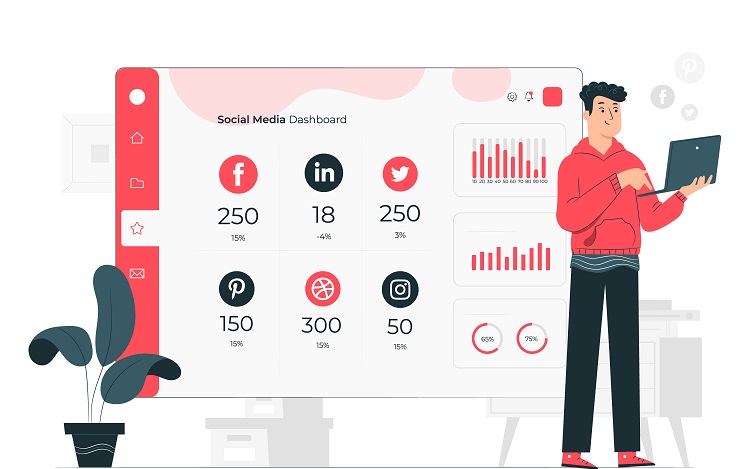Are you sick of the 9 to 5 and looking for something more? Have your circumstances changed, meaning you need to adjust your working hours and routine? Is it simply time for something new – something that inspires you and about which you feel passionate? If so, it could be time to start a lifestyle business.
In this article, we’ll look at what a lifestyle business is, include some examples of lifestyle business ideas, consider the merits of running a lifestyle business versus a job, and look at how you can get started. Read on to discover whether starting a lifestyle business could be the change that you need.
Table of Contents
ToggleWhat is a Lifestyle Business?
Let’s start with a quick lifestyle business definition. In simple terms, a lifestyle business is a business that you set up to provide you with enough money to enjoy a particular lifestyle. It’s not about working every available hour.
Rather, it’s about fitting work around your other priorities and using your business to ensure you have the time you need to focus on those other priorities.
How to Build a Lifestyle Business 2024
There are a number of steps to follow if you want to build a lifestyle business:
- Define your goals
If you are trying to build a business that fits your lifestyle and supports that lifestyle, you need to define that as part of your planning process. If you don’t write down your goals, it’s much easier to stray away from achieving them and lose your focus. The result? A business that is out of kilter with your lifestyle. - Find your niche
Explore ideas for the kind of business you want. There is a huge range of lifestyle business ideas out there – we’ll look at some of these in detail below – so take some time to think about what you’re good at, what you enjoy doing, and what there is a market for. Narrow this down until you have found your niche. - Carry out market research
Just because a lifestyle business is designed to support your lifestyle doesn’t mean you don’t need to take it seriously. If you don’t carry out the research needed to show you have a viable business idea and model, you could end up wasting a great deal of time, effort, and money. So do your homework, understand the market forces at play in your niche, identify your audience, and define how you are going to connect with them and why – all based on solid research. - Define your USPs
Understand and define your unique selling points (USPs). What makes your business different? Why should customers choose you? - Build your brand and audience
Create a brand identity and online presence. Consider social media accounts as well as a website. When doing so, keep your target demographics in mind and focus your activities accordingly. With your brand established, you can pay attention to growing your audience. - Map out your financial and other targets
Create a living document that you refer back to regularly. Monitoring the success of your lifestyle business will be key to how you shape its future. Without clearly defined targets, it will be harder to monitor that success. - Prepare for growth
Remember to adapt your business model activities as your lifestyle enterprise grows. The business is unlikely to unfold in exactly the way you planned, say be prepared to adapt to changing circumstances. Remaining flexible will allow you to make the most of the opportunities presented to you. - Review your business
Undertake a full review at least once a year to ensure that your lifestyle business is continuing to support your lifestyle as intended. If not, it’s time to make some changes.

List of Lifestyle Businesses Ideas
You have an abundance of choices when it comes to which kind of lifestyle business to create. We’ve included a few examples here to get you thinking but there are plenty more ideas out there.
To identify the perfect lifestyle business for you, think about what you’re passionate about, what you enjoy doing, what kind of budget is available to you to start the business, and how you can shape everything around your lifestyle commitments.
Business Lifestyle Photography

Setting up a photography service is a popular lifestyle business choice. A photography business is something that you can plan around your other life commitments with relative ease.
It’s not the cheapest business to set up, as you’ll need to invest in plenty of equipment, including high-quality digital cameras and a laptop and/or PC with sufficient storage and processing capabilities to handle huge image files.
However, with that expense taken care of, you’re free to schedule your photography sessions as and when you choose, fitting your hours and commitments around your lifestyle.
Photography can be a well-paid endeavor, particularly when you photograph events such as weddings or land a gig with a school to provide their annual pictures of each child.
Photography is also a business that allows you to pursue different interests within it. For example, if you’re interested in real estate, you can become a photographer within the property sector. If you prefer the buzz of attending events, you could become a photographer for weddings, parties, corporate events, and the like.
Bear in mind that where you live will impact the level of business available to you. If you live in a city, there will be more clients available than if you live in the countryside, so you need to factor that into your plans when establishing a photography lifestyle business.
Crafting Luxury and Lifestyle Businesses
If you have decent crafting skills and you enjoy the process of making things with your hands, then a luxury crafting lifestyle business could be for you. Crafting businesses are easy to set up, as you can run them from home.
Your costs initially will be the materials that you need, plus the cost of marketing your goods. You can do that in several ways, from running your own website to operating through sites such as Etsy. There’s also the potential to sell your goods in person at local makers’ markets and boutiques.
A crafting business is one of the more creative lifestyle business options available to you. However, bear in mind that any product you offer may see you undertaking the repetitive task of making the same item multiple times.
That’s something to think about when considering your product line and how customizable the products that you offer will be.
You also need to think about timescales and how you would cope with a surge in demand for your products. For example, a massive order right before you’re due to take a family holiday could be a major issue.
If you sell products online, the kind of negative feedback that the mishandling of such a situation can generate could be a big blow to your enterprise.
As with any venture, before setting up your crafting business you need to undertake market research to establish that there is demand for the product you intend to create.
Reach out to your target audience, ask them pertinent questions, and establish the level of appetite for your goods before you place a bulk order for materials.
Blogging
Blogging can serve as a lifestyle business if you find the right niche with the right level of demand. Blogging is increasingly competitive these days and isn’t an easy undertaking.
There are various different models that you can use in terms of monetizing your blog, so you need to be clear on which of these you intend to pursue from the outset. That’s because different monetization strategies will impact how you develop and grow the blog.
Blogging is a great lifestyle business in terms of allowing you to pursue something you feel passionate about. However, you do need to ensure that the topic you choose it’s something that is going to deliver sufficient demand over the longer term.
You also need to think about your SEO strategy and bear in mind that Google algorithm updates can have a huge and sudden impact on your level of income.
In terms of the hours you put in, blogging can be an ideal lifestyle business because you can choose as and when you work. It’s also a very low-cost option as all you need to pay for is hosting, your theme, and a couple of other minor expenses, plus the cost of your own time.
You also obviously need your own laptop, as you do with many lifestyle businesses, and potentially a video camera as well, as an increasing number of blogs are featuring video content.
One point to note is that blogging is not a get-rich-quick scheme. Starting a successful blog usually takes months. Realistically, when you plan to earn an income from blogging, you shouldn’t expect to see much of a return from your site in the first six to 12 months of running it. Just something to bear in mind!
Mobile Hairdressing
One excellent lifestyle business option is mobile hairdressing. If you have the skills and qualifications needed to be a hairdresser, mobile hairdressing can provide you with an easy way to run your own business without the fixed costs of operating a salon.
You will still need to take out relevant insurance but even so, your costs will be markedly lower than if you ran a salon-based business.
One of the key advantages of running your mobile hairdressing business is that you can fit it around your lifestyle. You can choose when you want to schedule appointments and when you don’t.
This makes it an ideal venture for those who have other commitments that are their priority, whether those be caring responsibilities or anything else.
A mobile hairdressing business also allows you to indulge your creative side when it comes to styling clients’ hair and working with them to achieve new looks. From helping clients to achieve the perfect look for the office to styling their hair for important occasions, there are plenty of chances to be creative.
Job vs Lifestyle Businesses
If you’re considering setting up a lifestyle business, a worthwhile exercise can be to compare the merits of running one to having a job.
When you have a job, and thus an employer, you are unlikely to be able to dictate the days and hours that you work. You may also enjoy far less freedom over the kind of work you undertake.
Of course, having a job does carry with it a range of benefits. You can call in sick and still get paid. You can take holiday and other kinds of leave and still get paid.
And when you’re out of the office, others will likely be available to cover your work. In addition, when you have a job, you can enjoy a range of other benefits, from social interaction to having others share responsibility with you.
When you run a lifestyle business, it’s often just you as a solopreneur responsible for everything and with potentially limited social interaction on a day-to-day basis.
Start-Ups vs Lifestyle Businesses
When your lifestyle business is new, it will be classed as a start-up. The term ‘start-up’ covers a range of businesses, from solo enterprises to ventures with rapidly expanding staff teams that have their sights set on world domination.
The two terms are not mutually exclusive. However, there is a growing trend toward using the term start-up to define a business that has rapid growth plans well beyond those of the average lifestyle business.
Lifestyle Businesses vs Growth Businesses
A lifestyle business is different from a growth business. A growth business is an enterprise that generates income at a much faster rate than the wider economy and focuses on raising money. A lifestyle business tends to aim to achieve a certain level of income and stop there.
Lifestyle Business vs Self-Employed

Self-employment can be defined as working for oneself, as opposed to working for an employer. That can be in a freelance capacity or as the owner of a business, such as a lifestyle business.
Can You Buy a Lifestyle Business?
Most lifestyle businesses are centered around the particular skills, enthusiasm, and contacts of their owner. That said, it is possible to buy a lifestyle business.
Consider the example used above of a crafting business. The business owner could transfer the responsibility for making the goods to another person, in which case that person could feasibly buy that lifestyle business.
Should You Buy a Lifestyle Business?
Just because you can buy a lifestyle business, doesn’t mean you should. As with any business decision, it requires careful thought and planning.
However, if you know the kind of lifestyle business you want to set up and it’s something that could potentially be bought, then going down that route could provide you with a quick and easy way to get started.
Books to Read About Lifestyle Business
If you’re thinking of setting up a lifestyle business, why not read one of the following books to explore the idea in more detail?
Company of One
Paul Jarvis’ Company of One focuses on staying small. It looks at ways that businesses can maximize happiness, sustainability, and profitability whilst avoiding growth.
Tim Ferriss’ The 4-Hour WorkWeek
Timothy Ferris’ The 4-Hour Work Week is often seen as the go-to book for those considering reconstructing their work priorities around their life priorities.
It’s essential reading for anyone looking to take a different approach and who is focused on working less and living more.
The Creative Entrepreneur
Isa Maria Seminega’s The Creative Entrepreneur is an enjoyable read for anyone looking to begin a lifestyle business that’s focused on creating, crafting, designing, or making. The book outlines the steps needed to turn a passion into a profit.
You might be interested to check those related posts as well:
- 20 Best Lifestyle Blogs [to Inspire Your Writing Career] in 2024
- Digital Nomad Lifestyle 2024 [Detailed Guide – All You Need to Know]
- 30 Best Business Blogs and Websites to Follow in 2024
FAQ
What makes a business a lifestyle business?
A lifestyle business is a business that is focused on achieving a certain lifestyle for the owner. Usually, that means the business aims to achieve a set level of income and no more.
What is the opposite of a lifestyle business?
A growth business is often considered to be the opposite of a lifestyle business. That’s because a growth business is focused on achieving as much money as possible, while a lifestyle business is all about the lifestyle that it enables.
What is a lifestyle entrepreneur?
A lifestyle entrepreneur can be considered somebody who founds their own business in order to change their lifestyle. They are likely to mold the business around other priorities in their life and not focus solely on how much money they can make.
Who is a lifestyle entrepreneur?
Anyone who has founded their own lifestyle business could be considered to be a lifestyle entrepreneur. Other examples could include individuals such as Timothy Ferriss, who is an internationally recognized advocate for putting lifestyle first.
Starting a lifestyle business can be hugely rewarding. Follow the basics outlined above, and you could soon be on your way to a better work-life balance.



